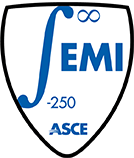Nanoscale Testing of Collagen Fibrils
University of Minnesota
Problems
Collagen, a molecule consisting of three braided protein helices, is the primary building block of a many biological tissues including bone, tendon, cartilage and skin. Staggered arrays of collagen molecules form fibrils which arrange into higher ordered structures like fibers and fascicles. Because collagen fibrils play a crucial role in determining the response of these tissues to mechanical and chemical forces, significant research has and continues to be directed toward development of theoretical and multiscale/multiphysics computational models of their stiffness, strength and toughness. Experimental data needed to guide the development of such models, however, is sparse and limited to small strain response. Our research group has taken on the challenge of producing the first experimental monotonic and cyclic stress-strain curves, up to fracture, of single collagen fibrils.
Approach
Type I collagen fibrils were isolated from the dermis of sea cucumber, Cucumaria frondosa. The fibrils are several dozen microns long, have cross-sectional dimensions ~10-500 nm, and can be easily isolated from their neighbors. Sea cucumber fibrils are relevant from a biomedical perspective because they are similar to those found in vertebrates. They have the same length, assemble with the same repeat period, possess the same gap/overlap ratio and crosslinking chemistry. Our ability to measure the mechanical properties of specimens of such dimensions relies on microelectromechanical systems (MEMS) devices. As described in detail in the references included below, the MEMS platforms have characteristic dimensions in the range of tens to hundreds of micrometers. Pure tension is applied to a collagen fibril (we have also used the same devices to test other one dimensional structures including carbon nanotubes) by attaching one end to a fixed pad, and the other to a pad that moves as a result of actuation by an electrostatic combdrive. The actuator can apply constant, monotonically increasing, or cyclic loading (up to ~10kHz) depending on whether direct or alternating current voltages are applied. Thus a unique feature of the MEMS platforms is their ability to apply very large numbers of cycles within a relatively short time period and to study the effects of very high frequency mechanical loading on nano scale structures. The elongation of the fibril is measured using a Vernier scale that is fabricated as part of the testing platform.
Findings
Experimental results were obtained from collagen fibrils immersed in a fluid and others tested in a less humid environment. Very rich mechanical responses were observed, including qualitatively different nominal stress-nominal strain curves (either linear, linear-yielding, or linear-strain softening) and pseudoelasticity (a hysteretic stress-strain curve with fully recoverable strain). Remarkably, those fibrils tested in a fluid environment achieved strains as high as 150% and ultimate stresses as high as 0.5GPa, depending on specimen size. The results have provided valuable insight that will guide the development of constitutive laws for collagen fibrils.
Impact
The MEMS testing platforms developed as part of this research offer promise for probing the mechanical behavior of all kinds of one-dimensional nanoscale structures. The devices can be modified to test two dimensional specimens under biaxial loading.
Core competencies
- Microelectromechanical systems (MEMS) platforms for structural testing at the micro and nano scales.
- Multiscale mechanical modeling of collageneous tissues and carbon nanotubes.
- Analytical and computational approaches for solving boundary value problems.
- In situ nanoindentation in scanning and transmission electron microscopy for nucleation of plasticity and fracture.
Current research team members
- Zhilei L. Shen (Ph.D. candidate, Case Western Reserve University, CWRU)
- Lucas Hale (Ph.D. Candidate)
- Minmao Liao (Ph.D. Candidate)
- Roberto Piccinin (Ph.D. Candidate)
- Dr. Yuye Tang (post-doc research associate)
- Dr. Marcin Bialas (visiting scholar)
Recent graduates
- Li Chen (Ph.D. 2005) Director of Microfabrication Lab, CWRU.
- Yuping Wang (Ph.D. 2003) ABAQUS, Inc.
Current research collaborations
- Reliability of MEMS materials and structures: Arthur Heuer and Hal Kahn (CWRU), Brad Boyce (Sandia National Labs)
- Bioinspired design of composite structures: Arthur Heuer (CWRU)
- Mechanics of collagen: Steve Eppell (CWRU) and Markus Buehler (MIT)
- Mechanical testing of carbon nanotubes: Jun Lou and Boris Yakobson (Rice Univ.)


